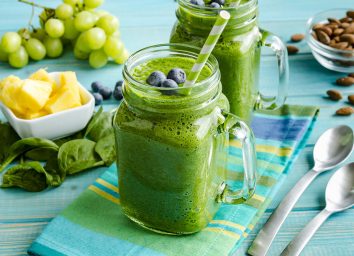Secret Tricks for Eating Your Way to a Flatter Stomach, Say Nutritionists
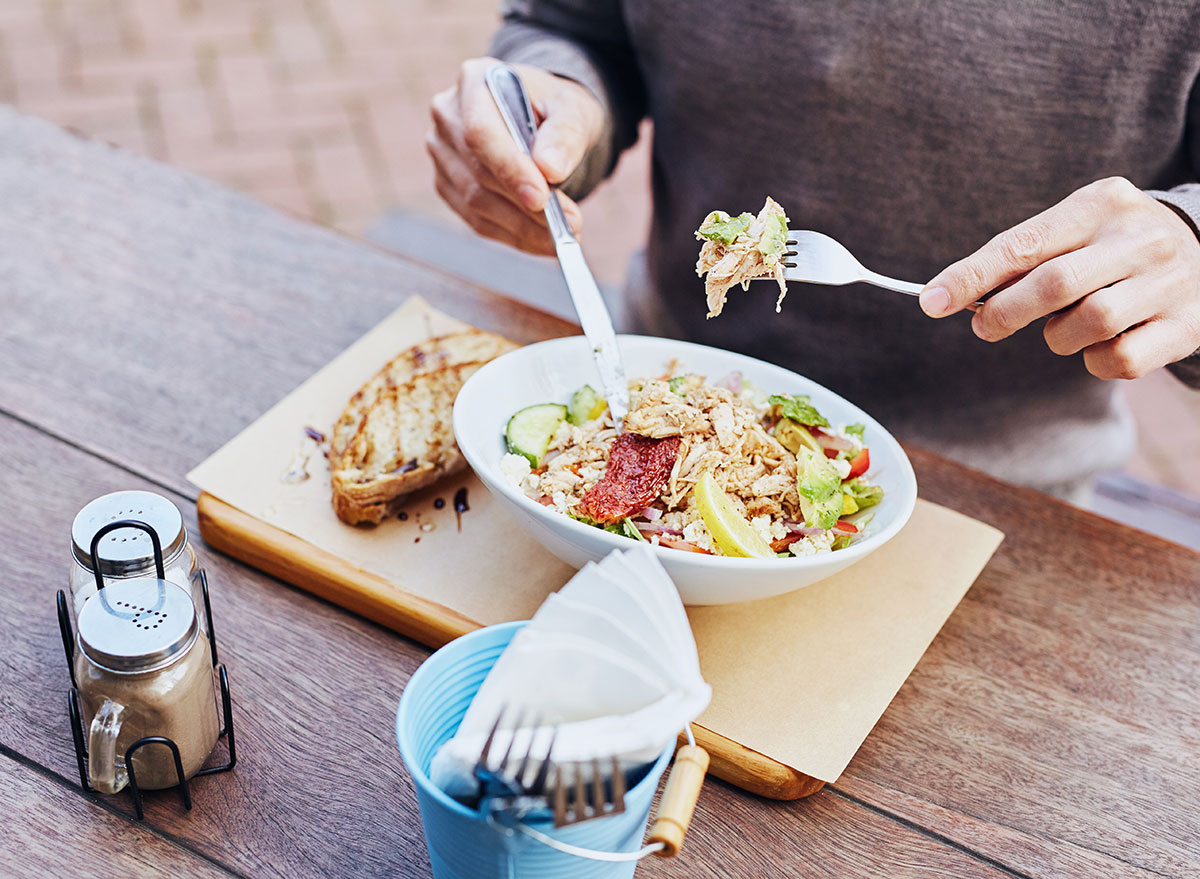
The secret to eating your way to a flatter stomach isn't a trick at all. There's no sleight-of-hand, no magic involved although many believe there must be some secret formula that no one has thought of until now.
Why do we want tricks? Because losing weight is really hard. And most people don't like to do things that are really hard. So, we're always searching for that easy path to thin. And when we see someone who has lost a ton of weight, we have to know: How did you do it? Please, let us in on the secret!
Well, if you analyzed how most people behaved over the months it took them to slim down, you'd probably notice some variations of a recurring practice: they removed or reduced certain foods and drinks from their diets and replaced them with other foods and drinks. Most often, calorie-dense processed foods get the boot and are replaced by, you guessed it, whole foods, mostly vegetables and some fruits, whole grains, and lean proteins.
Not much of a secret right? Yes, but that's the big secret no one wants to accept: Losing weight and flattening your stomach is best achieved by making your diet of 75% to 80% whole and minimally processed foods. Do that and you'll likely burn more calories than you're swallowing—and you'll flatten your belly. It's simple math, but not so simple to execute because we are human, and pizza tastes amazing.
For some guidance on exactly how to accomplish this goal of reducing processed foods and consuming more weight-loss-friendly foods, we asked nutritionists for their best "belly-flattening" tips. Read on to see if you notice a pattern, and for more on how to eat healthy, don't miss 15 Underrated Weight Loss Tips That Actually Work.
Eat vitamin Bs to banish belly fat
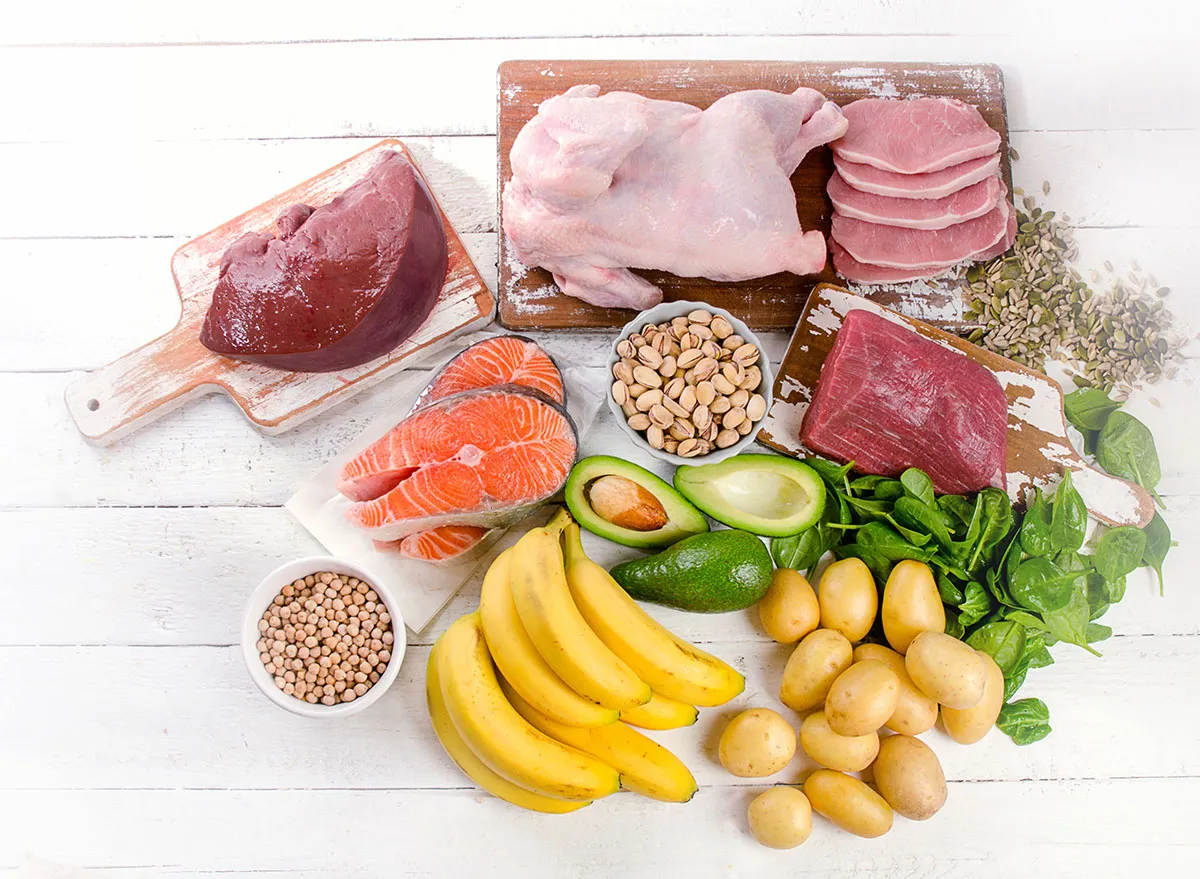
Psychological stress can turn into belly fat. When you are highly stressed, your body produces more of the hormone cortisol. "While cortisol is great for times of fight or flight, overproduction can cause elevations of cortisol and some research shows it could cause fat deposits into the abdomen," says registered dietitian nutritionist Jeanette Kimszal, RDN, founder of Root Nutrition. Stress also depletes vitamins B1, B2, B3, B6, and B12, all of which help maintain a healthy nervous system and also fight belly fat. Studies indicate that B vitamins found in dark leafy greens, avocados, sunflower seeds, almonds, broccoli, beans, lentils, and citrus fruits are needed calming stress, she says.
Fill up on fiber
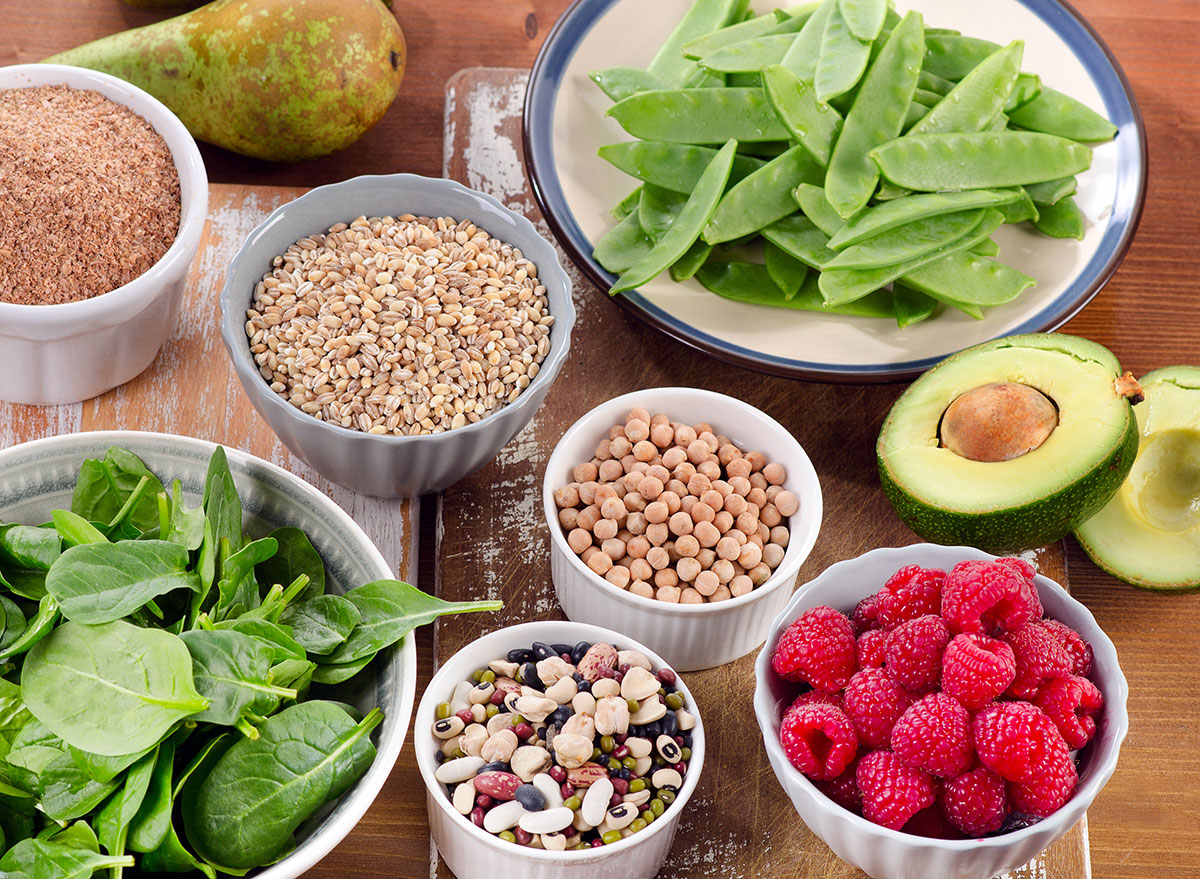
The most important type of fat to get rid of is visceral, or belly, fat. "It's the abdominal fat that's intertwined around the organs and has been linked to metabolic syndrome, type 2 diabetes, and cardiovascular disease," says registered dietitian nutritionist Nicole Stefanow, MS, RDN.
Eating more fiber is an effective way to fight that hard-to-lose belly fat. Make sure some of that fiber is the soluble kind that can be dissolved in water. "It acts as a prebiotic that is fermented by your healthy gut bacteria to create Short Chain Fatty Acids (SCFAs), which research has linked to decreased visceral fat and adiposity," she says. So, if you are looking for a diet that helps flatten your belly, choose foods that are high in sources of soluble fiber like beans and legumes, oats, and barley, and cruciferous vegetables like broccoli and Brussels sprouts.
Sprinkle on spices
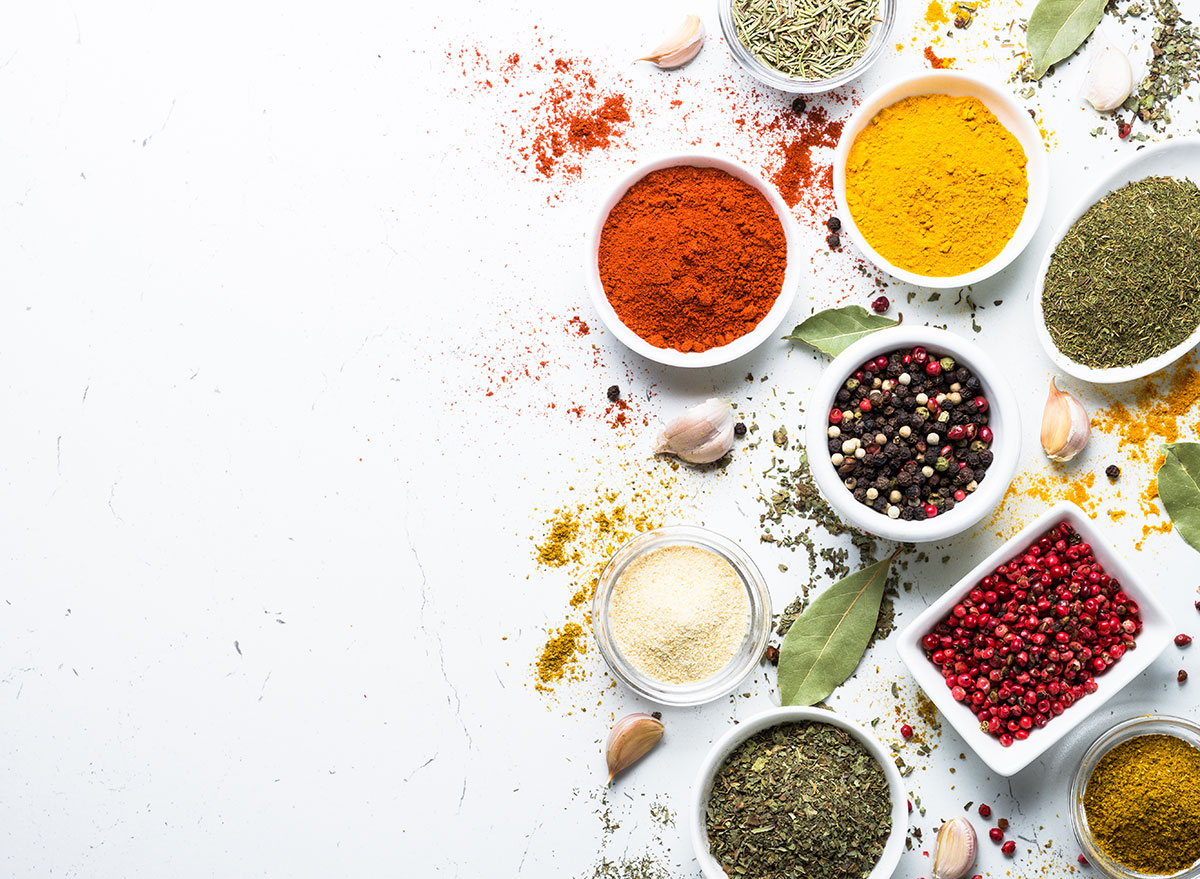
Simply flavoring your food with spices can help you trim belly fat. "Turmeric, fenugreek, ginger, nutmeg, sage, thyme, cinnamon, curry leaf, and chili pepper spices like cayenne, paprika, red pepper, and chili powder lower blood sugar levels by improving your body's response to insulin," says Melina B. Jampolis, MD, a board-certified physician nutrition specialist and author of Spice Up, Slim Down: A Guide To Using Herbs and Spices To Live A Longer, Healthier, and More Vibrant Life. She also recommends:
Cumin. "In one study overweight and obese women were divided into two groups, both decreasing their daily calories to 500," she says. "One group ate a little less than a teaspoon of cumin every day in their yogurt, and after three months, they lost three more pounds than those who didn't eat cumin."
Saffron. Research suggests it may help people control excess snacking and help diabetics reduce belly fat.
Cardamom. This highly fragrant herb "may help counter the effects of eating too many carbohydrates," says Jampolis. "In one study overweight subjects who took cardamom gained less belly fat and avoided increases in their blood sugar, cholesterol, and inflammation levels," she says.
Break up with sweetened beverages
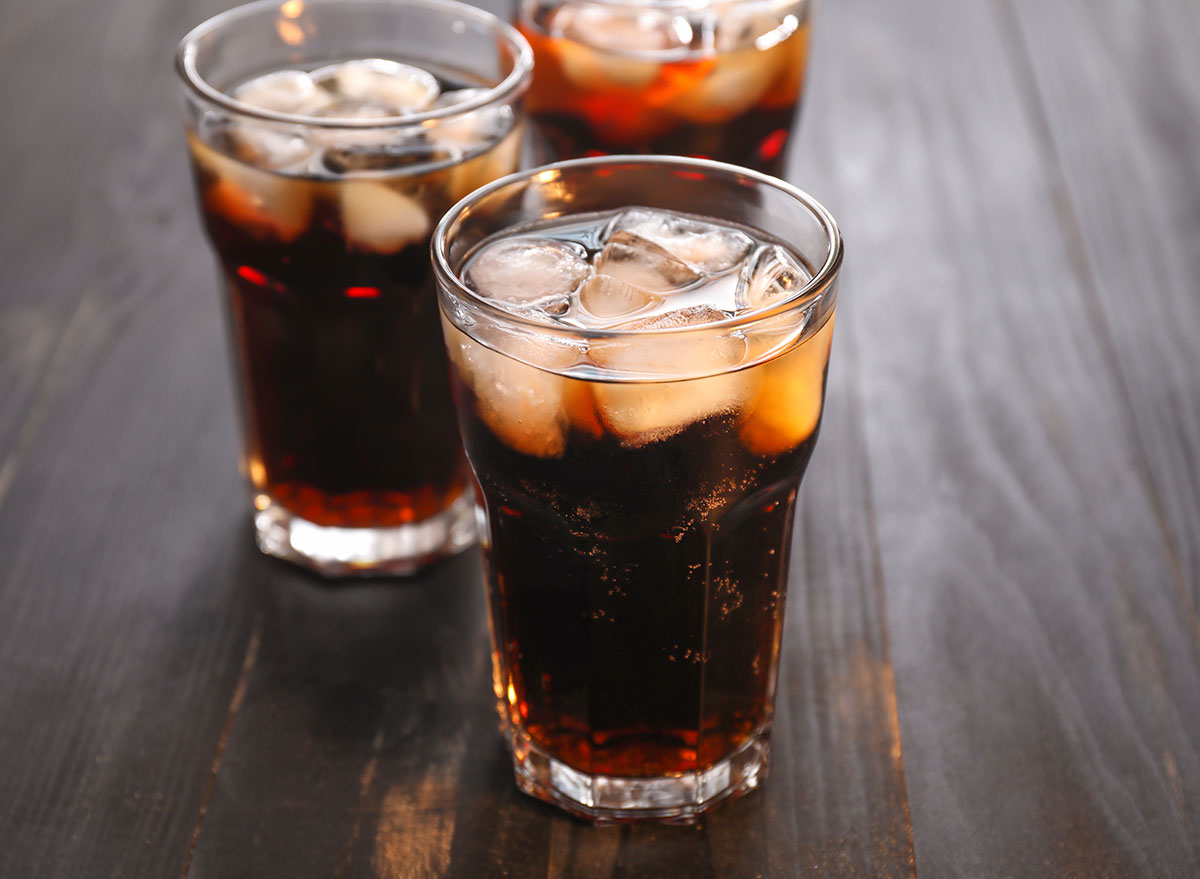
As we alluded to earlier, one of the best moves you can make to significantly reduce your belly size is to stop drinking sugar-sweetened beverages (SSBs) like soda, juices and fruit punch, and sweet iced tea. "Sweet drinks are silent killers that cause weight gain, especially the more dangerous belly fat, while putting you at higher risk of heart disease, diabetes, fatty liver disease, stroke, and Alzheimer's disease," says Dr. Jampolis.
She recommends replacing SSBs with water or green tea. "Studies have shown that a type of antioxidant found in green tea called EGCG (epigallocatechin-3-gallate) can aid in fat-burning during exercise, improve the body's response to insulin and reduce belly fat," says Jampolis. (Related: Secret Effects of Drinking Green Tea, Says Science.)
Slow down your eating
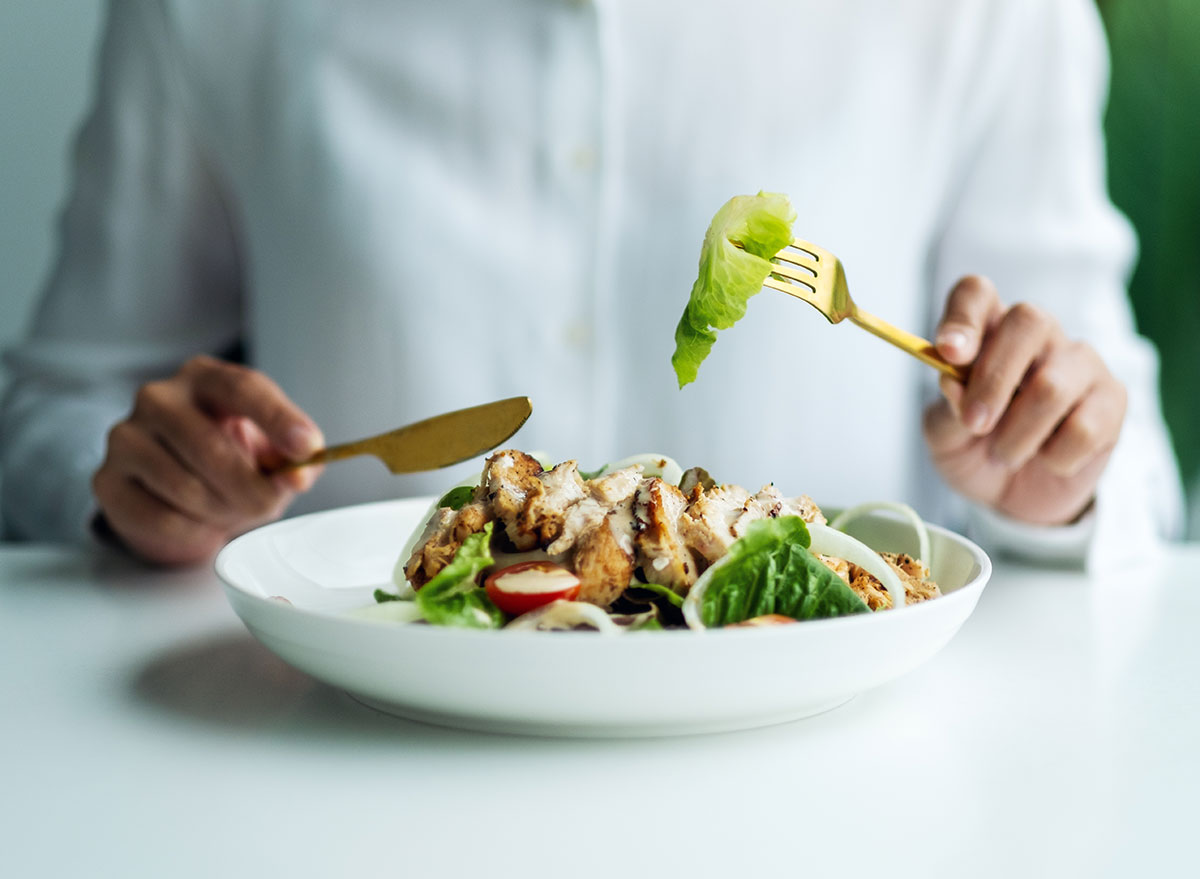
Even eating healthy whole foods can push out your belly with gas if you eat too quickly and don't watch your portion sizes, says Trista Best, MPH, LD, a registered dietitian at Balance One Supplements. When you scarf down food fast, you end up swallowing more air, which leads to bloating. Inflammatory foods like gluten or dairy products or even high fiber meals can exacerbate bloating and gas especially when the necessary enzymes are not present in the gut for adequate digestion. "Slowly integrating cruciferous vegetables and fiber-rich foods is a good way to prevent gas," she says.
Eat like a Greek
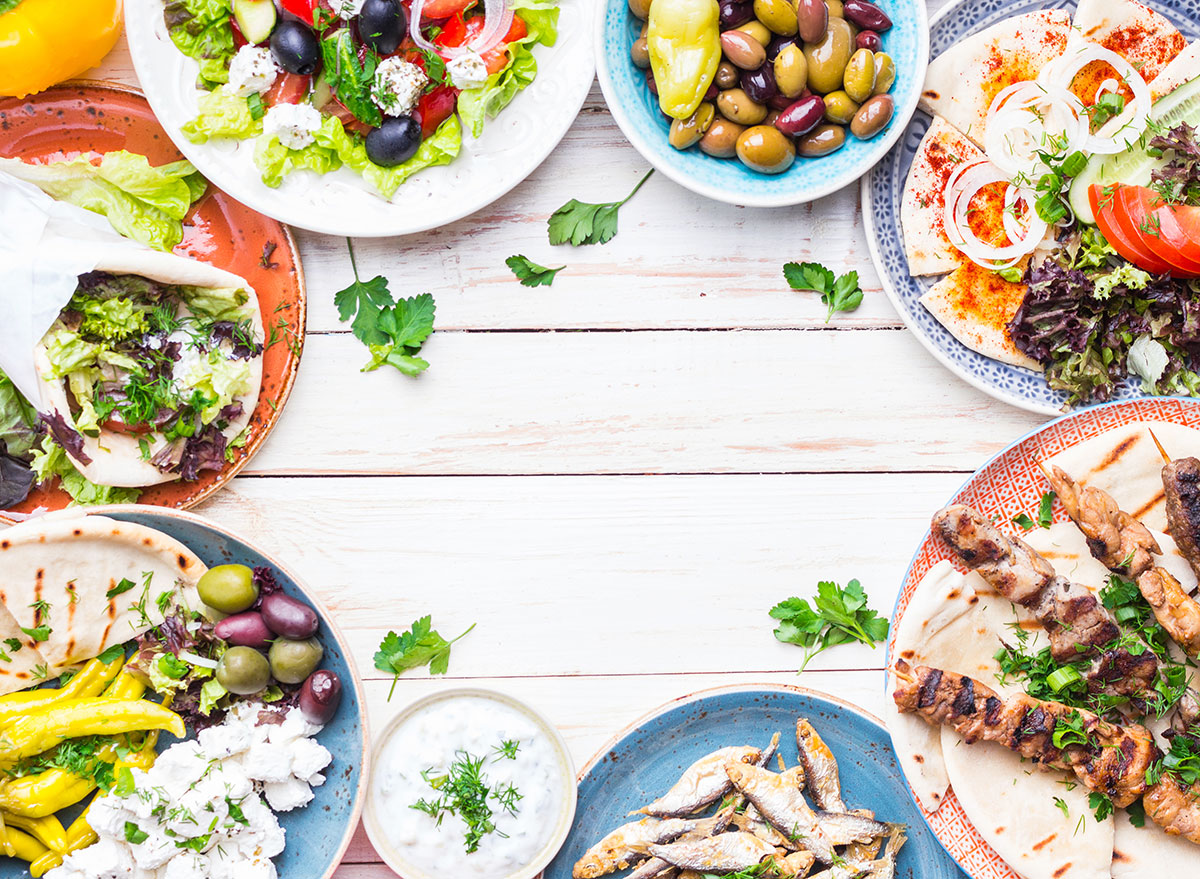
Kristin Kirkpatrick, RDN, a dietitian at the Cleveland Clinic Wellness Institute, says the best way to "clean up your diet," is to build 90% of your food choices around the Mediterranean diet way of eating. Based on the traditional diet of long-living people in the countries that border the Mediterranean Sea, this diet style focuses on plant-based foods, such as whole grains, vegetables, legumes, fruits, nuts, seeds, and spices, plus fatty fish, and poultry in moderation. Olive oil is the main fat. "If I feel a client needs a little bit more of intensive intervention, I'll work with a Mediterranean protocol that is a little bit lower in carbs, which means a little less grains, beans, and legumes," says the host of the PBS show The New Rules of Food with Kristin Kirkpatrick.
Stop before you're stuffed
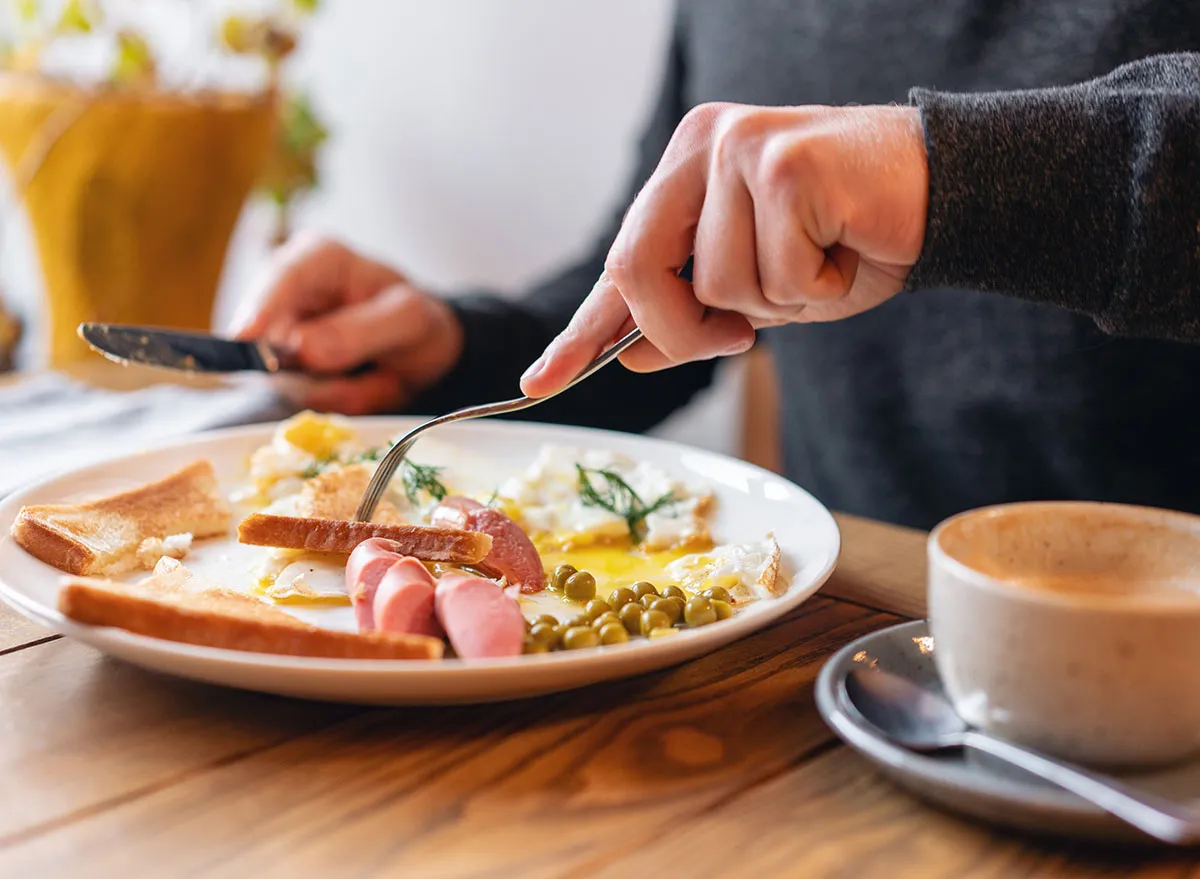
For many people, the cue to stop eating is a clean plate, a feeling of fullness, or unbuttoning the top of the jeans. Stopping before you feel full is a simple strategy that cuts calories and can help you lose weight. "Look at food as fuel," advises Kirkpatrick. "Eating to fullness means you're over-fueling your body." Instead, stop eating when you are no longer hungry. "It can feel empowering to push your plate away before reaching that feeling of belly fullness."
Combine a whole foods diet with resistance exercise
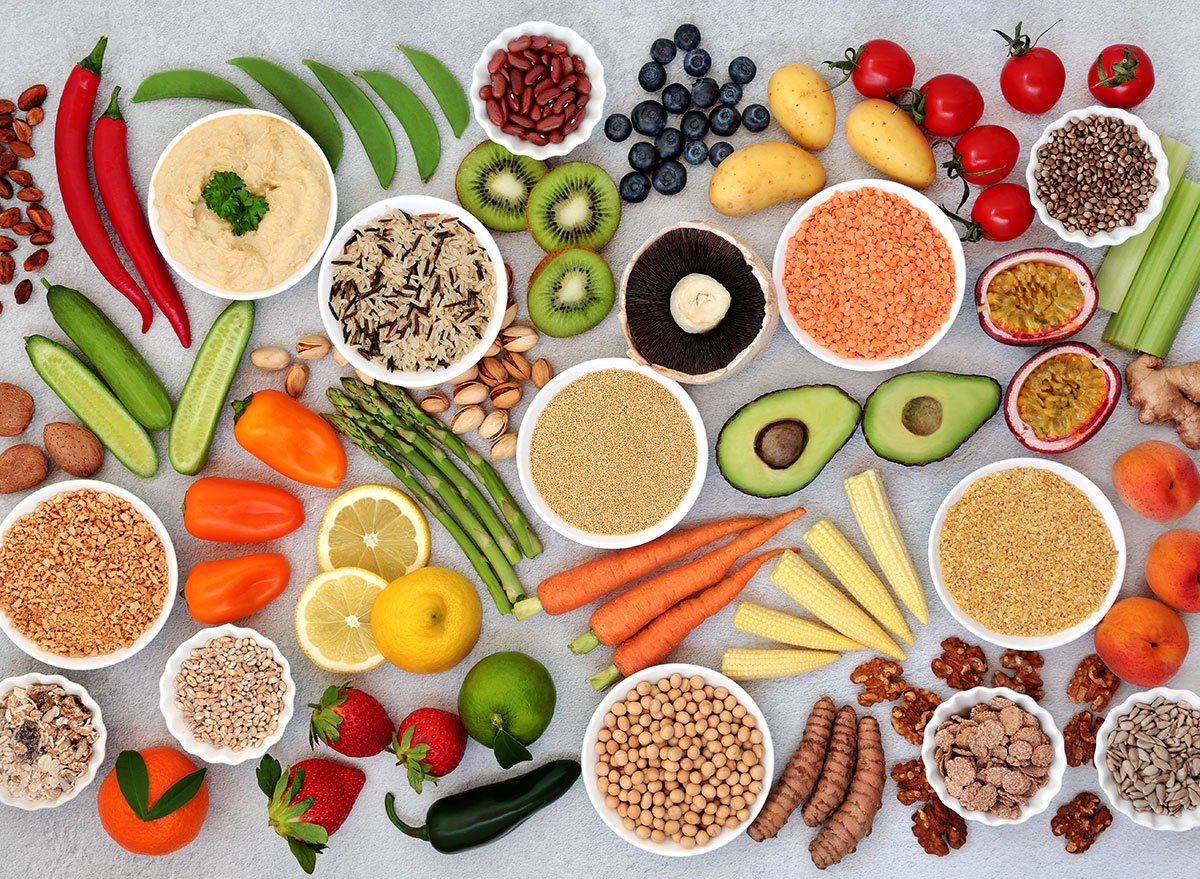
It's not a trick but it works like magic. "If you stick to whole foods, avoid grains, sugar and dairy, add in a regular resistance routine, and have a little patience, losing lower abdominal fat will come," says nutritionist Jay Cowin, NNCP, RNT, director of formulations for Asystem. "The right fuels at the right time coupled with resistance routines (plus a little cardio) can have amazing effects on body composition."
Try intermittent fasting
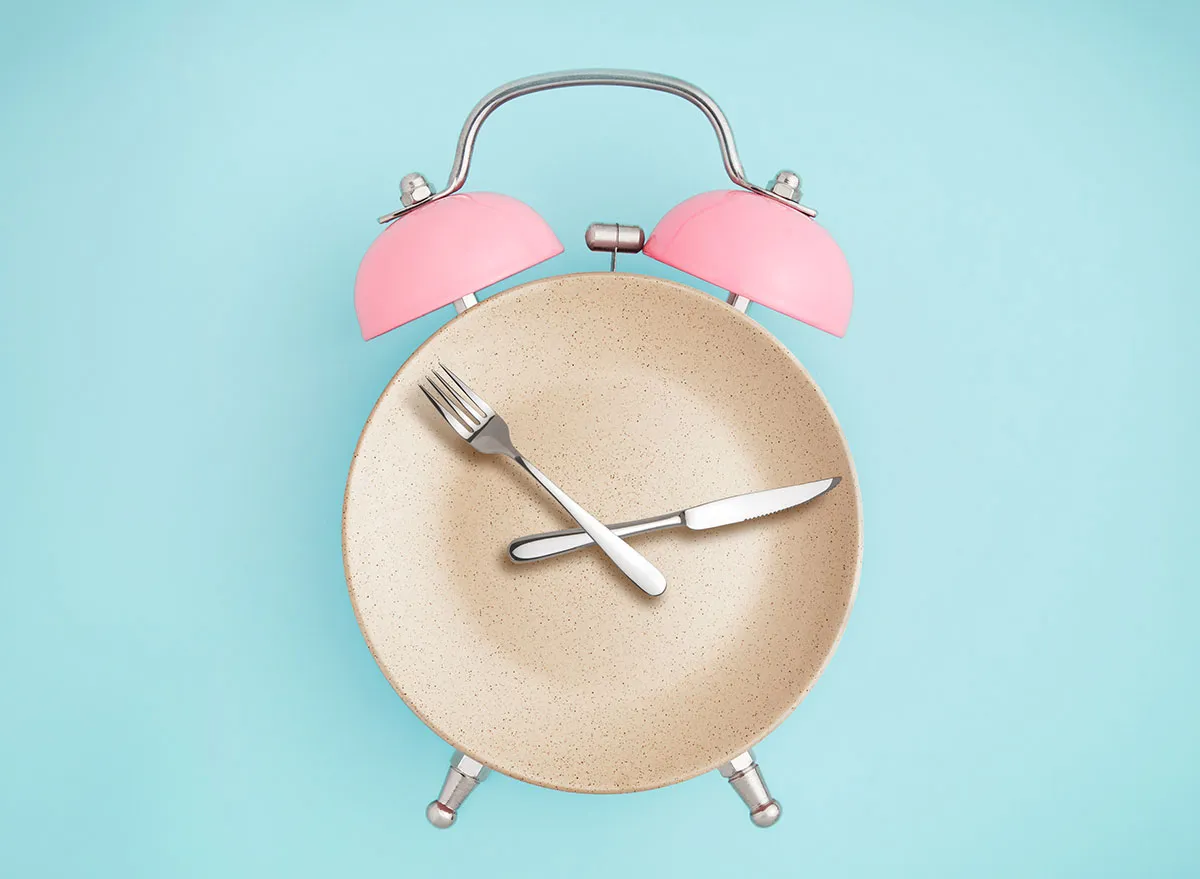
Limiting your window of time for eating can help stoke your body's ability to incinerate fat. That's the premise behind intermittent fasting. "When we sleep, we are fat-burning machines, and this spills over when we wake up; if we continue that fast for a few hours after we rise, we can utilize that ability to burn more belly fat," says Cowin. Extending that non-eating window to 11 or noon gives you roughly 16 hours of uninterrupted calorie burn. "Once we put carbs/sugar into our mouths our metabolism really slows down and we store the unburned calories," Cowin says. "The right fuels at the right time coupled with resistance exercise (plus a little cardio) can have amazing effects on body composition."
READ MORE: One Surprising Side Effect of Intermittent Fasting, New Study Says
Switch dinner out to lunch out
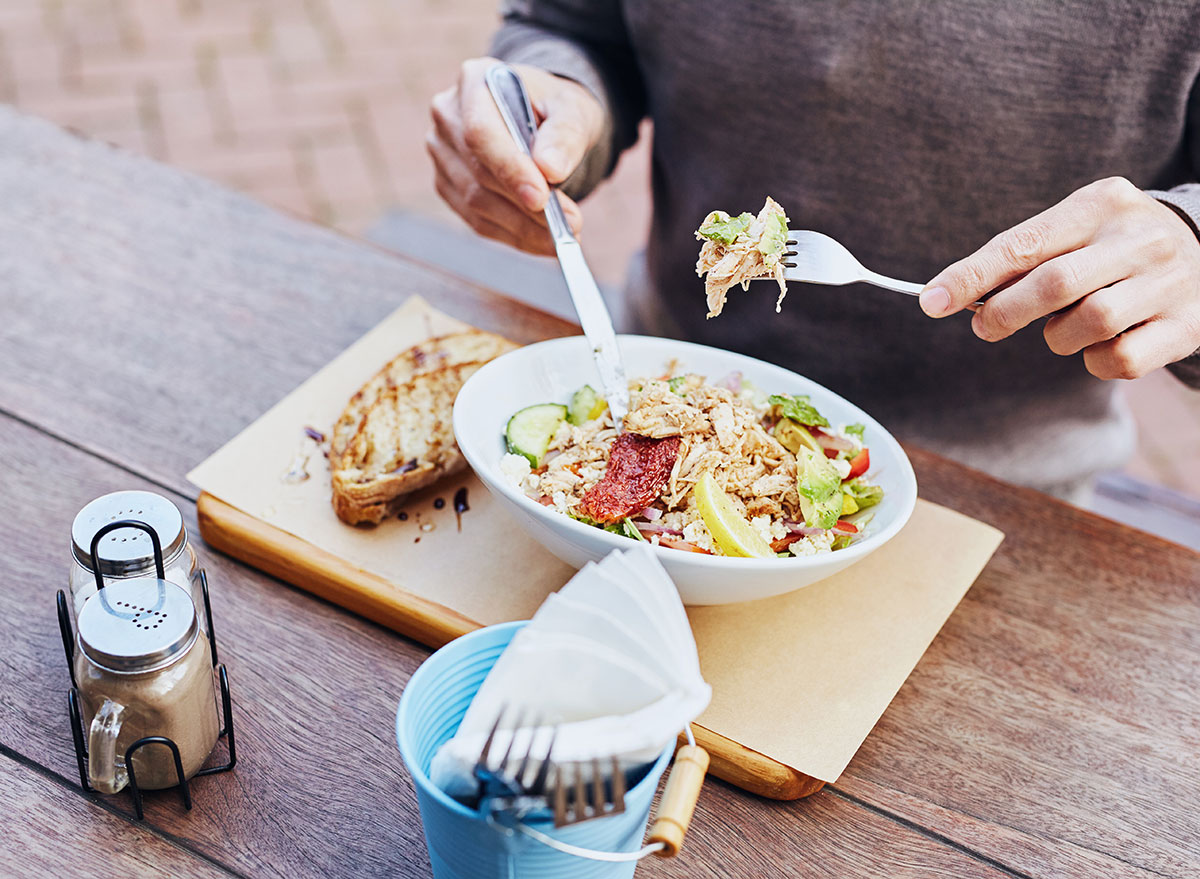
The friends we hang with play a big part in why and how we eat. Out to dinner, they may order extra appetizers, bread, desserts for the table, or another round of drinks, making it hard for you to stay focused on eating healthy.
You don't want to stop dining with friends, so what can you do? "One tip is to meet for lunch rather than dinner," suggests weight-loss expert Ilana Muhlstein, MS, RDN, author of You Can Drop It! How I Dropped 100 Pounds Enjoying Carbs, Cocktails & Chocolate—and You Can Too! "Lunches can be simpler to navigate, especially when it comes to skipping the dessert course and alcoholic drinks." And here's a way to prep for lunch that'll reduce the number of calories you consume: Have a low-cal pre-lunch snack or appetizer. A study in the journal Appetite found that eating an apple or ordering a clear soup before a restaurant meal can lower the total calories intake of the meal by 20%.
Eat flat-belly foods
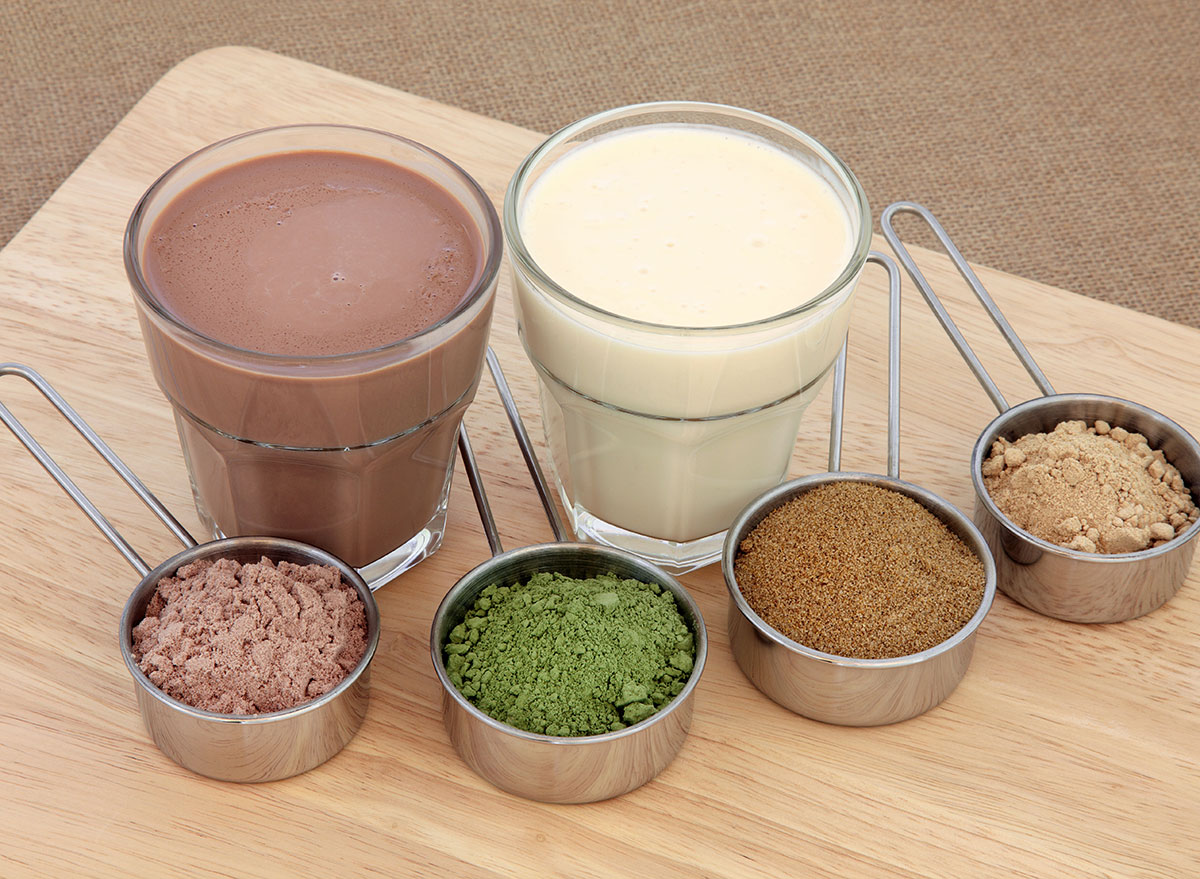
"Eating for a flatter stomach should be about maintaining a calorie deficit (meaning consume fewer calories than you burn) by including low-calorie density, high-volume foods that keep you feeling full but do not cost a lot of calories," says National Academy of Sports Medicine Certified Nutrition Coach Karisa Karmali, founder of Self-Love and Fitness. That means eating what she calls "flat-belly foods" containing lots of water and fiber and foods high in protein. "Proteins (like lean chicken breast, fish, beans and whey protein smoothies) build muscle and raises your metabolic rate." To get the most protein boost for the calories, check out Popular Foods with More Protein Than Beef.
Read this next:
